Related Research Articles

Coorong National Park is a protected area located in South Australia about 156 kilometres (97 mi) south-east of Adelaide, that predominantly covers a coastal lagoon ecosystem officially known as The Coorong and the Younghusband Peninsula on the Coorong's southern side. The western end of the Coorong lagoon is at the Murray Mouth near Hindmarsh Island and the Sir Richard Peninsula, and it extends about 130 kilometres (81 mi) south-eastwards. Road access is from Meningie. The beach on the coastal side of the peninsula, the longest in Australia, is also commonly called The Coorong.
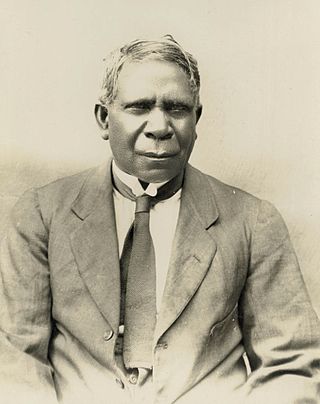
David Ngunaitponi, known as David Unaipon, was an Aboriginal Australian preacher, inventor, and author. A Ngarrindjeri man, his contribution to Australian society helped to break many stereotypes of Aboriginal people, and he is featured on the Australian $50 note in commemoration of his work. He was the son of preacher and writer James Unaipon.

The Ngarrindjeri people are the traditional Aboriginal Australian people of the lower Murray River, eastern Fleurieu Peninsula, and the Coorong of the southern-central area of the state of South Australia. The term Ngarrindjeri means "belonging to men", and refers to a "tribal constellation". The Ngarrindjeri actually comprised several distinct if closely related tribal groups, including the Jarildekald, Tanganekald, Meintangk and Ramindjeri, who began to form a unified cultural bloc after remnants of each separate community congregated at Raukkan, South Australia.
Hindmarsh Island is an inland river island located in the lower Murray River near the town of Goolwa, South Australia.
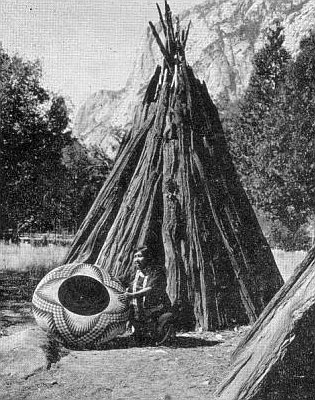
Basket weaving is the process of weaving or sewing pliable materials into three-dimensional artifacts, such as baskets, mats, mesh bags or even furniture. Craftspeople and artists specialized in making baskets may be known as basket makers and basket weavers. Basket weaving is also a rural craft.

Ruby Charlotte Margaret Hunter, also known as Aunty Ruby, was an Aboriginal Australian singer, songwriter and guitarist, and the life and musical partner of Archie Roach.

James Unaipon, born James Ngunaitponi, was an Australian Indigenous preacher of the Warrawaldie Lakalinyeri of the Ngarrindjeri.
Diane Robin Bell is an Australian anthropologist, author, and social justice advocate. Her work focuses on the Aboriginal people of Australia, Indigenous land rights, human rights, Indigenous religions, violence against women, and on environmental issues.

Kelly Jean Church is a black ash basket maker, Woodlands style painter, birchbark biter, and educator.
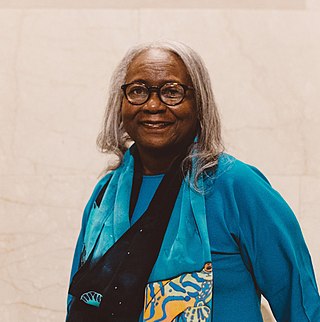
Mary Jackson is an African American fiber artist. She is best known for her sweetgrass basket weaving using traditional methods combined with contemporary designs. A native of coastal South Carolina and a descendant of generations of Gullah basket weavers, Jackson was awarded a MacArthur Foundation fellowship in 2008 for "pushing the tradition in stunning new directions." Mary Jackson is a recipient of a 2010 National Heritage Fellowship from the National Endowment for the Arts.
Trevorrow is a Cornish surname originating in the Cornish language. Notable people with the surname include:

Raukkan is an Australian Aboriginal community situated on the south-eastern shore of Lake Alexandrina in the locality of Narrung, 80 kilometres (50 mi) southeast of the centre of South Australia's capital, Adelaide. Raukkan is "regarded as the home and heartland of Ngarrindjeri country."
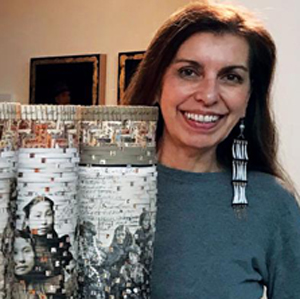
Shan Goshorn was an Eastern Band Cherokee artist, who lived in Tulsa, Oklahoma. Her interdisciplinary artwork expresses human rights issues, especially those that affect Native American people today. Goshorn used different media to convey her message, including woven paper baskets, silversmithing, painting, and photography. She is best known for her baskets with Cherokee designs woven with archival paper reproductions of documents, maps, treaties, photographs and other materials that convey both the challenges and triumphs that Native Americans have experienced in the past and are still experiencing today.
Doreen Maude Kartinyeri was an Ngarrindjeri elder and historian, born in the Australian state of South Australia. She played a key role in the Hindmarsh Bridge controversy and made many contributions to Indigenous activism.
The Jarildekald people, also known as Yarilde or Yaralde, are an Aboriginal Australian people of South Australia originating on the eastern side of Lake Alexandrina and the Murray River.
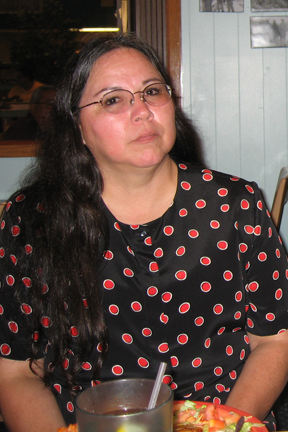
Lisa Telford is a Git'ans Git'anee Haida weaver who creates contemporary garments, shoes and other objects using Northwest Coast style weaving techniques. Her work serves as a commentary on Native identity, stereotypes and fashion.
Jenni Kemarre Martiniello is an Australian Aboriginal (Arrernte) glass artist. She is best known for making glass vessels inspired by woven forms traditionally made by indigenous peoples. She is also known for her advocacy for and support of indigenous artists.
Yvonne Koolmatrie is an Australian artist and weaver of the Ngarrindjeri people, working in South Australia.

Regina Pilawuk Wilson is an Australian Aboriginal artist known for her paintings, printmaking and woven fiber-artworks. She paints syaws, warrgarri, and message sticks. Her work has been shown in many Australian and international museums, collections and galleries. She has won the General Painting category of the Telstra National Aboriginal & Torres Strait Islander Art Awards in 2003 for a syaw painting. Wilson has been a finalist for the Kate Challis RAKA Award, the Togart Award, and the Wynne Prize.
Major Lancelot "Moogy" Sumner, also known as Uncle Moogy, is an Aboriginal Australian elder, cultural adviser, dancer, and environmental activist in South Australia.
References
- ↑ "Ellen Trevorrow", Design and Art Australia Online
- ↑ "Tom Trevorrow: A Ngarrindjeri Man of High Degree", Diane Bell, Transnational Literature, volume 6 #1, November 2013
- ↑ "Ellen Trevorrow", Ngarrindjeri Culture Hub
- ↑ "Ellen Trevorrow", Design and Art Australia Online
- ↑ "Ellen Trevorrow’s Pondi gives form to a Ngarrindjeri legend", Peri Strathern, Murray Bridge News, 8 June 2022
- ↑ "Ellen Trevorrow, Ngarrindjeri people - Circular mat". National Gallery of Australia. Retrieved 2024-07-22.
- ↑ "Ellen Trevorrow". AGSA – The Art Gallery of South Australia. Retrieved 2024-07-22.
- ↑ Trevorrow, Tom; Trevorrow, Ellen (2001), Grim, John (ed.), "Kumarangk: The Survival of a Battered People", Indigenous traditions and ecology : the interbeing of cosmology and community, Harvard Press, ISBN 978-0-945454-27-4
- ↑ Ellen Trevorrow at IMDb